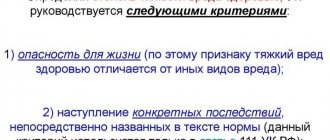Murder is the taking of a person’s life as a result of the action or inaction of a criminal. The action is the use of bladed or firearms, chemicals (sulfuric acid), arson or freezing of the victim. Inaction – leaving a person in dangerous conditions, failure to provide accessible assistance.
Murder can be intentional or unintentional; for each case, the legislation of the Russian Federation has a clause, according to which the court makes a decision on the case of the accused.
Multi-channel free hotline Legal advice on criminal law. Every day from 9.00 to 21.00
Moscow and region: +7 (495) 662-44-36
St. Petersburg: +7 (812) 449-43-40
Types of murders
The Russian Federation guarantees each of its citizens, regardless of their age and position in society, the right to life. Criminal law is aimed at protecting and ensuring the safety of the individual.
At all times, life was considered the highest value, and deprivation of it was sometimes punished cruelly - in ancient times, a murderer was sent to the gallows or had his head cut off. Later, the electric chair became the weapon of death penalty. Nowadays, in many developed countries, the death penalty as a punishment for murder has been abolished.
There are countries where execution by firing squad is still practiced. An example would be China, where the death penalty is imposed not only for murder, but also for pimping, counterfeiting banknotes, and poaching.
Deprivation of life may have aggravating circumstances or, conversely, mitigating circumstances. Or without them at all.
Aggravating factors include factors that negatively characterize the killer and add to his punishment:
- murder of a minor;
- murder of a pregnant woman;
- deprivation of life committed with extreme cruelty;
- murder with rape;
- murder due to racial or religious hatred;
- mass kill;
- deprivation of life for the purpose of selling the organs of the deceased.
What are the mitigating circumstances for murder? For example, when a husband kills his wife’s lover or one of the family members takes the life of an alcoholic father who abuses his household. Punishment for murder under mitigating circumstances is prescribed in Articles 106-108.
Types of murder under mitigating circumstances
The following types of such offense are distinguished:
- murder by the mother of a newborn child, in this situation the object of the offense is the newborn child. According to medical practice, a child is considered a newborn within 4 weeks after birth;
- deprivation of life in a state of passion, the object of illegal actions in this situation is the person who provoked the state of passion;
- deprivation of a person’s life caused by exceeding self-defense measures; also, this category can include murder as a result of abuse of official duties in the process of detaining a person.
Each type of such offense has different reasons; criminal liability for murder in mitigating circumstances is determined individually by a court decision. To understand the types of such offenses, you need to analyze each of them in detail.
Murder of a newborn child by a mother
The object in this case is a newborn up to four weeks of age. The subject is his mother, who is 16 years old. Murder can be committed with or without premeditation, during or immediately after childbirth, as a result of the critical mental state of the mother in labor or the state of insanity at the time of the crime.
Murder committed immediately after childbirth is associated with negative emotions during the birth process. The woman experiences severe pain for a long time, fatigue from endless contractions, and fear for her life and health. As a result, she may kill the child, believing that it was he who caused her physical and moral suffering.
As a rule, a woman experiences enormous stress during the postpartum period. If we add to this situation the negative impact of the environment on her emotional state, the woman may experience a mental disorder.
The reason for changing the psycho-emotional state of a woman in labor may be:
- cheating on a spouse or his leaving the family;
- denial by the spouse of his paternity;
- fear of being left with a child on the street, without money and housing;
- pressure from loved ones;
- fear of being judged;
- unwillingness to raise a child born from a rapist.
As we see, there are a sufficient number of reasons.
Murder can be committed either during the birth itself, or after the birth as a result of physical force, for example, a blow to the head with a blunt object, knife wounds, strangulation or drowning of the baby. Also, an offense can be committed as a result of inaction: the mother stops feeding the child or leaves him alone for a long time.
This murder provides for punishment - restriction of freedom for a term of two to four years, or forced labor for up to five years, or imprisonment for the same term.
Murder of a newborn child by a mother
This type of crime is divided according to the actions performed: deprivation of a newborn child’s life immediately after childbirth or during it, murder of a child as a result of a psychologically traumatic situation, commission of illegal actions in a state of insanity or severe mental disorder. Murder during or immediately after childbirth is considered to be intentional actions aimed at taking the life of a newborn.
Psychotraumatic situations that can lead to the death of a newborn include financial difficulties, fear of parents, abandonment of the child by the father, and more. If in the process of committing illegal actions the new mother was not aware of her actions, then this case also applies to the deprivation of a child’s life under extenuating circumstances.
Important! When a mother deprives a newborn child of life, both the direct and indirect intent of the person committing the crime is taken into account.
Murder in the heat of passion
Affect is a state resulting from strong negative emotions such as anger, irritation, shock or fear. Killing as a result of this condition occurs immediately after the situation that caused the condition. If some time has passed, the court will not take this fact into account to reduce the punishment.
A bright, uncontrollable outburst of emotions can occur under the following circumstances:
- threat or blackmail of the victim;
- prolonged moral or physical humiliation or bullying;
- immoral behavior towards the victim;
- cumulative effect from the immoral behavior of the object;
- insult, ridicule, etc.
Murder in the heat of passion is not fully punished, since the citizen who violated the law could not control his actions at that time. As a result of severe mental shock, the subject loses the ability to make a forecast and evaluate his actions, in other words, he loses self-control and does not realize what he is doing.
Proving that the killer was in an uncontrollable state at the time of the crime can be difficult. Testimony from witnesses who can confirm his condition during and after the murder is usually required.
This condition, which indicates severe emotional shock, includes a number of signs:
- physical condition (pallor of the skin, increased sweating, weakness or chills are noted);
- the criminal is lost in space and time;
- sometimes the outburst of emotions can be so strong that, having spent all his energy in a short period of time, the killer goes to bed.
In addition to witness testimony, the court may order a medical examination.
Examples of murders committed in a state of passion:
- The stepfather abused his stepdaughter for a long time. During one of the quarrels, she could not stand it and inflicted several fatal blows on him with a knife. This is an example of cumulative affect.
- While drinking alcohol, a conflict occurred between the men, as a result of which the victim insulted the mother of the accused. This is an example of murder due to insult.
- The husband came home early from work and found his wife in bed with a friend. An example of affect as a result of a wife's immoral behavior.
- The grandmother blackmailed her grandson with her will for the apartment in exchange for help with the housework. During one of the conflicts that arose, she threatened that the will would be drawn up in the name of another relative. The grandson, who had long fulfilled the elderly woman’s every whim, could not contain his emotions and hit her on the head with a heavy figurine. This is an affect due to blackmail.
Types of murder under mitigating circumstances
1. Murder of a newborn child by a mother: direct object
is the life of a newborn child. A child is considered a newborn according to medical practice for four weeks after birth.
Objective side
consists of three alternative acts:
murder of a newborn child during or immediately after childbirth
- murder during childbirth can occur before the end of the physiological process of childbirth, and murder immediately after childbirth - immediately after the end of the physiological process of childbirth.
It does not matter whether the murder was planned even before the birth or the intent to kill suddenly arose during childbirth or immediately after childbirth; murder of a newborn child in a psychotraumatic situation - the situation can be caused by any factors
- financial difficulties, a father’s abandonment of his child, fear of parents, etc.;
murder in a state of mental disorder, which does not preclude sanity,
occurs in the case when, during the commission of a crime, due to a mental disorder, the mother could not fully understand the actual nature and social danger of her actions (inaction) or control them.
Subject of the crime
– special – mother of a newborn.
Subjective side –
direct or indirect intent.
2. Murder committed in a state of passion: by the direct object
is the life of the person who caused the state of passion.
Signs of the objective side:
a) it is committed in a state of sudden, strong emotional excitement;
b) the state of passion is caused by: violence; bullying; serious insult on the part of the victim; other illegal or immoral actions (inaction) of the victim; a long-term psychotraumatic situation that arose in connection with the systematic illegal or immoral behavior of the victim.
The following circumstances indicate the suddenness of the onset of strong emotional disturbance:
occurs immediately as a reaction to the behavior of the victim; There is no gap in time between the murder and the actions of the victim that caused the state of passion.
Subjective side
– direct or indirect affected intent.
The subject of the crime
is a person in a state of passion.
3. Murder committed when exceeding:
a) the limits of necessary defense
– occurs in the case of a clear, obvious discrepancy between the defense and the nature and danger of the attack, when harm is deliberately caused to the offender unnecessarily;
b) measures necessary to apprehend the person who committed the crime,
– may be the case if the measures necessary to detain a person who committed a crime clearly did not correspond to the nature and degree of public danger of the crime committed by the detainee and the circumstances of the detention, when the person was unnecessarily caused clearly excessive harm not caused by the situation.
The immediate object
is the life of the offender, the life of the detainee.
Subjective side
- direct or indirect intent.
The subject
is the person who repels the attack, the person who detains.
Criminal liability for these crimes begins at the age of 16.
Table of contents
Murder by excess of self-defense
The ability to stand up for your life in the event of an attack is the right of every citizen of the Russian Federation. It is enshrined constitutionally and has one “but”. In self-defense, the victim can only use those measures that are not prohibited by law.
Exceeding self-defense occurs as a result of overestimating the current situation and one’s capabilities. For example, the killing of a thief while attempting to pickpocket, or the victim killing an attacker who is much weaker than him physically.
If a physically strong and healthy man uses all his force against a pregnant woman or a teenager, he will undoubtedly exceed the permissible limit of self-defense.
The following will not be considered self-defense:
- if a person first provokes a conflict and then begins to defend himself;
- if the attacker stopped his threats and retreated, and the victim continues to attack;
- if the attempt occurs not on life and health, but on material assets; It will not be considered self-defense if the victim's cell phone was stolen and the victim responded by committing murder.
It can be very difficult to prove that the killer did not exceed the necessary measures during the attack. It is also necessary to interview witnesses who can confirm that the victim had no other choice.
Otherwise, the victim becomes the accused and is liable to the fullest extent of the law.
Murder committed in violation of necessary measures for arrest
The arrest of the offender by the victim is considered a necessary defense and is equivalent to lawful actions when he has suffered harm equal to his resistance.
Suppression will not be considered lawful if:
- the offender did not resist;
- if his death occurred as a result of an escape attempt.
A person who has committed an attack with the intent of robbery or murder, with the aim of causing damage to health or material values, is subject to detention. If the detention process took place without these reasons, it will be considered illegal and will entail punishment for intentional deprivation of liberty.
Detention will also be considered illegal if its purpose is not to deliver the offender to the authorities, but to commit lynching over him.







